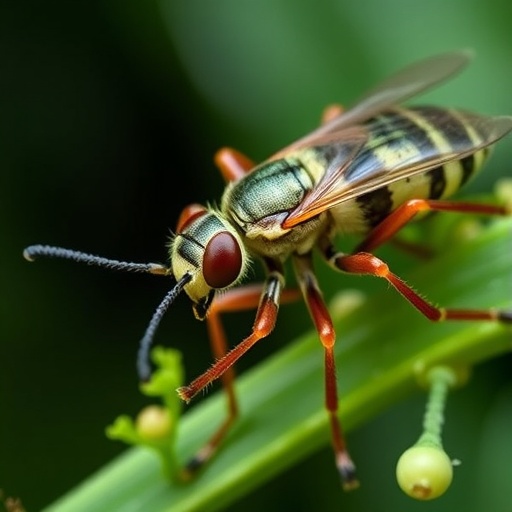PROTECT YOUR DNA WITH QUANTUM TECHNOLOGY
Orgo-Life the new way to the future Advertising by Adpathway
A groundbreaking study has revealed a concerning development in the sustainable management of fungal diseases impacting one of the world’s most widely cultivated vegetables: broccoli. Researchers investigating commercial broccoli seeds have found that these seeds can harbor the fungal pathogen Alternaria brassicicola, notorious not only for causing leaf blight and head rot but also for exhibiting resistance to multiple fungicides commonly used in agricultural practice. This discovery signals a critical juncture for seed health testing and disease management strategies, underscoring the urgency of incorporating fungicide resistance screening into routine seed quality control.
Alternaria brassicicola has long been recognized as a formidable adversary in brassica crop production, thriving in warm and humid environments where it degrades the aesthetic and market value of broccoli heads. What is particularly remarkable about the new findings is the demonstration that commercial broccoli seeds serve as reservoirs for A. brassicicola isolates exhibiting cross resistance to multiple fungicides, including some with entirely different modes of action. This revelation is the first of its kind, highlighting the potential for resistant fungal populations to disseminate on a global scale through contaminated seed lots.
The investigative team, led by Bhabesh Dutta, Ph.D., a professor and extension vegetable pathologist at the University of Georgia, conducted a comprehensive screening of commercial seeds from two widely grown broccoli cultivars. By recovering fungal isolates from these seeds and subjecting them to rigorous in vitro assays, the researchers were able to quantify the sensitivity of A. brassicicola to three prominent succinate dehydrogenase inhibitor (SDHI) fungicides: boscalid, penthiopyrad, and fluopyram. These fungicides are cornerstone treatments deployed by growers in an attempt to curtail fungal spread and maintain crop health.
On a deeper molecular level, the study unveiled specific point mutations within the succinate dehydrogenase (SDH) genes of A. brassicicola isolates that correlate strongly with phenotypic resistance to boscalid and penthiopyrad. These genetic alterations disrupt fungicide binding and thereby undermine efficacy, an insight achieved through cutting-edge mutation screening techniques that enable precise mapping of resistance-conferring alleles. Indicatively, over 93% of isolates demonstrating fungicide resistance under laboratory conditions possessed these defining mutations, confirming the robustness and stability of the resistance phenotype in naturally infected seed populations.
What further complicates disease management is the identification of isolates resistant not only to SDHI fungicides but also to azoxystrobin, a Quinone outside inhibitor (QoI) fungicide with a distinct mode of action. The co-occurrence of resistance to multiple fungicide classes within a single pathogen population indicates that conventional single-fungicide strategies may be insufficient to manage these resilient fungal populations. This multilayered resistance amplifies the threat posed by seedborne A. brassicicola, as it can introduce resistant strains into regions with no prior history of fungicide application, broadening the geographic footprint of resistance.
Recognizing the urgent need for proactive monitoring, the researchers have innovated a PCR-based allele-specific assay targeting the newly identified mutations. This molecular diagnostic tool facilitates rapid, sensitive detection of fungicide resistance alleles directly from seed samples, a leap forward compared to traditional bioassays that are time-consuming and less precise. Such advancements empower regulators, seed producers, and growers alike to make well-informed decisions regarding seed lot acceptance, fungicide choice, and integrated disease management strategies.
Historically, seed health testing has focused predominantly on the presence or absence of pathogens, often neglecting the fungicide resistance profiles of these organisms. This study reframes the paradigm by demonstrating that fungicide resistance screening should be incorporated into seed health programs wherever feasible. Doing so promises to limit the inadvertent spread of resistant fungal populations, ensuring that growers have access to high-quality, clean seeds that do not compromise the efficacy of their disease management tools.
The implications of these findings are profound. With the global movement of seeds facilitating agricultural productivity, the hitchhiking of resistant fungal isolates represents a silent but potent threat to food security and sustainable agriculture. Fungicide resistance can reduce the options available to growers, escalating production costs, and potentially driving increased chemical use that is both environmentally and economically unsustainable. Therefore, early detection and containment of resistant strains at the seed stage introduce a critical checkpoint in the battle against plant pathogens.
The study was conducted as part of a larger multidisciplinary effort supported by the U.S. Department of Agriculture and the National Institute of Food and Agriculture under the Specialty Crops Research Initiative. Such federally funded projects stress the significance of collaborative research endeavors to address emerging challenges in crop protection, particularly those that bridge molecular biology, plant pathology, and agricultural practices to develop comprehensive management frameworks.
Moreover, the research findings highlight the sophistication of fungal pathogen populations, which possess the capacity to evolve rapidly under selective pressures imposed by fungicide application. Monitoring this evolutionary dynamic paints a clear picture of the arms race between human-deployed chemical controls and pathogen adaptation. It also underlines the necessity for integrating molecular diagnostics, resistance management, and sustainable agricultural protocols to stay ahead in this ongoing conflict.
Beyond broccoli and A. brassicicola, the techniques and insights gained through this research ring as a cautionary note for other crop-pathogen systems worldwide. The framework established for detecting seedborne fungicide resistance at the genetic level could be replicated for various pathosystems, potentially revolutionizing seed health standards on a global scale. Such preemptive vigilance is essential to preserve the longevity of existing fungicides and delay the onset of widespread resistance.
In summary, this landmark study not only establishes the presence of fungicide-resistant Alternaria brassicicola within commercial broccoli seeds but also provides practical, scalable tools for its rapid detection. The fusion of molecular genetics and applied pathology demonstrated by the research team equips the agricultural community with novel methods to monitor, manage, and mitigate fungicide resistance. As agriculture confronts the twin demands of productivity and sustainability, such advances are integral to safeguarding crop health, ensuring economic viability for growers, and maintaining the integrity of food supply chains.
Subject of Research: Detection and characterization of fungicide resistance in Alternaria brassicicola from commercial broccoli seeds
Article Title: Commercial Broccoli Seeds Harbor Multidrug-Resistant Alternaria brassicicola: Molecular Insights and a Novel PCR-Based Diagnostic Tool
News Publication Date: Not specified in the source material
Web References: https://doi.org/10.1128/aem.01083-25
References: Study published in Applied and Environmental Microbiology, American Society for Microbiology
Keywords: Fungal pathogens, Seeds, Fungicides, Agriculture
Tags: Alternaria brassicicola resistancebroccoli cultivation challengesbroccoli seed health testingcommercial broccoli seed contaminationcross resistance in fungal pathogensdisease management strategies for brassica cropsfungicide resistance in agricultureimpact of fungal diseases on cropsimplications for global agricultureseed quality control measuressustainable management of fungal diseasesvegetable pathology research


 3 hours ago
9
3 hours ago
9




















 English (US) ·
English (US) ·  French (CA) ·
French (CA) ·